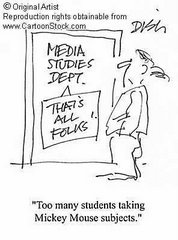
This new 'MUST KNOW' section is in response to some queries I have had about definitions of Key Terms.
'Audience' is the term used to mean the people who watch, read, buy, listen to, or use a media product.
In studying the media it is necessary to think about audiences. Many of the institutions in charge of the world’s media will go to great lengths to work out how you, as an audience, function and what you want. A course like this gives you a chance to understand the importance of audience and its impact on the way films and music and many other things are created in today’s world. Looking at the 'target audience' for a media product means looking at those people that its makers think will watch/buy/use it.
Institutions' is the term used to mean the companies who are reponsible for creating media products. So this includes, film companies, record labels, magazine publishers and so on.
The Media does not exist of its own accord. Films, magazines, adverts, radio, the music you listen to - all are created by colossal institutions. Some of these are arguably more powerful in this world than governments. Many have a massive influence on how you encounter information and what you think of major events taking place in the world at the moment. When we look at this area there are certain questions that should be asked:
• how do these institutions operate?
• who owns them?
• what influence do they have?
Why it is important to study institutions
When thinking about a media product it is important to understand the people that have input into its creation. Mostly, media companies are driven by money, but they may have other intentions. For example, they may seek to educate us, or influence us to think in a certain way, or even buy certain products. Knowing that a particular institution is behind a particular product may be important. Branding tells us that we will like, or dislike a product.

So by studying institutions we learn to expect different things from the BBC than Sky Television.
Representation Sometimes you will come across people of your age represented quite controversially in a range of media texts. You need to look no further than the nearest soap opera to see your age being screened to millions in a way that you may find offensive or patronising. Through looking at representation, you are given a chance to see how media people - most of them decades older than you - depicts people of your age. Is their representation fair?
Why representation isn't simple
When considering representation it is important to consider these points:
• is the representaion based on reality? Or are stereotypes relied on?
• does the way certain groups are represented alter how audiences think of them?
• to what degree will the representation of certain groups be accepted by the audience?
D White
















No comments:
Post a Comment